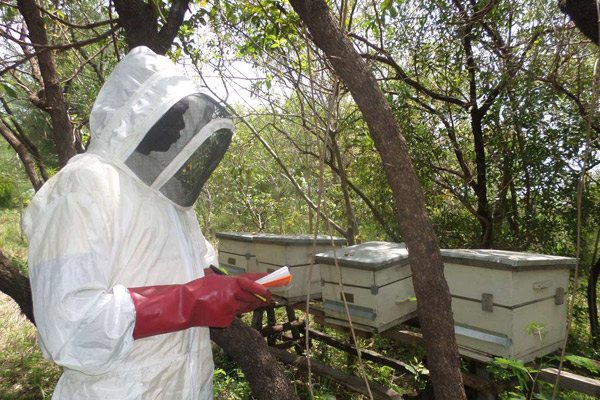Martin Onyango, wearing a white bee suit, a pair of red gloves and gumboots, dips his hand in a beehive and extracts a honeycomb.
The beehive at Ogongo Secondary School along the Homa Bay-Mbita Road is among several that he has set up for learning institutions in the region.
The school’s apiary is located at a section hosting pine trees. Next to the farm is an orchard with several pawpaws, mangoes, oranges and sunflower plants.
“The school has eight beehives. This is one of the project we have established in secondary schools to enhance apiculture,” says Onyango, who makes hives, trains farmers on modern apiary technology and processes honey for sale under his business name Parecma Enterprise.
Some of the secondary schools he has worked with include Mbita High, Pehill High, Ogongo, Rapura and Waware in Homa Bay and Migori counties.
“I work with schools because students are the agents of change. We want the youth to embrace apiculture as a source of income,” says Onyango, noting he saw an opportunity in bee farming in the region where fishing was once the mainstay but it is now dwindling, therefore, there is need for alternative income sources.
He designs the beehives and finally contracts carpenters to make them.
“We are working on having a workshop since currently we contract carpenters to make the beehives after sourcing for wood from Kisii,” says Onyango, who holds a Diploma in Agriculture from Bukura Institute of Science and Technology and has specialised training in bee keeping from the National Beekeeping Institute in Ngong.
The firm makes the hives on orders, with his biggest supply recently being making 300 hives for Cefa, an Italian NGO working in Homa Bay, Siaya and Migori counties.
In a good month, he sells 15 to 20 beehives at Sh5,700 each.
HUGE POTENTIAL
He also buys raw honey from farmers at Sh230 per kilo, processes it using a centrifuge and retails it under the brand name Delica, with 1kg going at Sh650 and 500g for Sh350.
There are also sachets that go for as little as Sh20 for easy accessibility.
“Our products were certified by the Kenya Bureau of Standards in 2014 and we sell them in Mbita, Kisumu, Kisii, Nakuru and Nairobi. In a good month, we make honey sells of Sh40,000 to Sh70,000,” says Onyango, who worked at International Centre of Insect Physiology and Ecology (Icipe) for close to 10 years.
He started the enterprise in 2014 after his contract with Icipe ended. With a capital of Sh70,000 from his savings, he set up the business and bought a machine which helps in honey extraction.
He has employed four staff who help in running the business.
“The main challenge my business face is apiphobia (fear of bees) from locals, which has led to negative attitude. So many people believe that bee keeping is not our tradition. But since the fish stock in the lake is dwindling, we must push the idea of beekeeping to boost incomes.”
In five years, Onyango plans to establish a honey extraction unit, a workshop to make hives, bee suits for protection and to make candles and lotions.
His advice to anyone who wants to get into beekeeping is that they should not fear bee stings if they want to reap from the insects.
Prof Matthews Dida, a lecturer at Maseno University’s Department of Agriculture, says beekeeping has huge potential in most parts of the country although the venture thrives in semi-arid areas such as Baringo, Ukambani and parts of North Eastern.
“As long as you have a proper site with less disturbance from human activities and noise, trees and water source, you are good to go,” says Prof Dida, adding demand for honey is high thus beekeeping can boost rural incomes.
Source: Daily Nation

